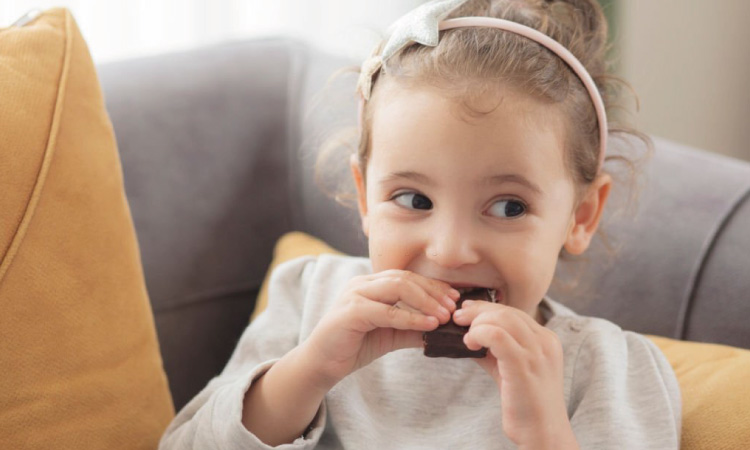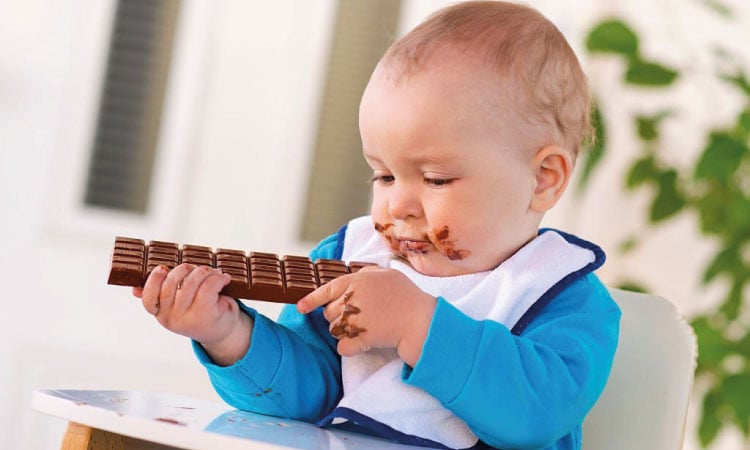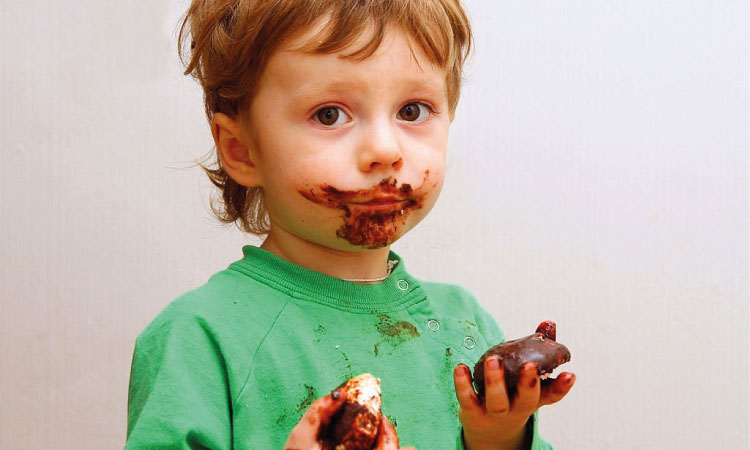Children are naturally drawn to chocolate, which is understandable. There is a lot of debate among parents as to when is the best time to introduce chocolate to babies, and lot of conflicting information as well. This is due to health and allergy concerns associated with chocolate consumption. Chocolate for babies too early can be problematic. This article will help to clear up a lot of questions about giving chocolate to babies.
At What Age Can Babies Have Chocolate?
Chocolate contains caffeine as well as theobromine, a caffeine-related compound. Theobromine, on the other hand, is only one-tenth as strong as caffeine1. Even for infants who have reached the age of six months and are already able to consume other types of solid foods, it is the caffeine content of chocolate that is the main cause for concern.
Waiting until your child is two is a better strategy when it comes to giving him his first piece of chocolate. Babies under 24 months may not have a fully developed digestive system to process the food, so wait until then to introduce them to chocolate. To avoid allergic reactions, make sure that the chocolate you give your baby does not contain any potential allergens. In addition, it is best, to begin with, dark chocolate for babies.
Chocolate contains refined sugars and caffeine, and is best avoided till your child is over 2 years of age.
Why Should Chocolate Not Be Introduced Too Early To Babies?
In addition to caffeine and a not-fully-developed digestive system, there’s another reason to avoid giving baby chocolate too early. By introducing chocolate and other sweet flavors early on, babies may develop a preference for sweeter foods and refuse savory and bitter options. Chocolate is usually high in added sugar and very sweet. One of the primary reasons why chocolate should not be introduced to infants too early is that it can help them become accustomed to a variety of flavors, rather than encourage their natural preference for sweets.
Related Reading: 10 Most Important Nutrients For Children
Are Chocolates Good For Babies?

No, to put it briefly. Babies might enjoy chocolate, but it’s not a good idea to feed them any because:
- It contains caffeine: Caffeine is a stimulant that can raise the heart rate and cause spikes in blood pressure. Even though the amount of content is not high enough to cause health issues in adults, for babies, chocolates may have enough caffeine to negatively affect their health
- It contains stimulants: In addition to sugar, chocolate contains stimulants such as theobromine and phenylethylamine, which may affect your infant’s nervous system
- It may adversely affect brain development: Furthermore, chocolate contains the chemical anandamide, which has the potential to interfere with brain function if it is consumed excessively2
Related Reading: 12 Best Foods For Baby Brain Development
What Happens If A Baby Eats Chocolate?
While the occasional chocolate bite may not be harmful after the age of two, giving your infant excessive amounts of chocolate at a young age may increase his risk of developing chronic diseases like diabetes, cardiovascular issues, and obesity. Children who are exposed to sugary foods at an early age may have trouble eating vegetables in the future. This will negatively impact their nutritional intake.
When children are exposed to an excessive amount of sugar at a young age, their risk of developing tooth decay is significantly increased. Keep this in mind before serving dishes like a chocolate mousse to a baby, which contain a rich combination of chocolate, cream, sugar, eggs, and butter.
What You Need to Know About Giving Your Baby Chocolate
When it comes to giving chocolate to your baby, there are a few things to consider besides possible allergies.
- Choking hazard: Chocolate bars could have nuts or raisins that could make the baby choke
- Risk of tooth decay: Sugar encourages the growth of acid-producing bacteria that may speed up dental decay. Infants have only milk teeth, which are slowly developing. Due to the thinner enamel shell, primary teeth are typically more fragile than permanent teeth. So, the sugar in chocolates makes babies more likely to get cavities
- Can cause digestive issues: Babies’ digestive systems aren’t geared up yet to deal with complicated foods like chocolate. So, giving them chocolates before 2 years may bring about digestive issues
- May develop food aversion: It’s best to keep chocolate out of the baby’s reach until he’s had a chance to eat a variety of healthy foods. If your child is exposed to chocolate at a young age, he might develop a distaste for healthier foods as he gets older
What Happens If A Baby Accidentally Ate Chocolate?
If the baby eats a small amount of chocolate accidentally, it will not harm him or her in any significant way. You can leave it if the baby isn’t showing any symptoms of an allergy. Then, if the baby is showing signs of discomfort, take it to the pediatrician’s office.
Can A Baby Be Allergic To Chocolate?
An allergic reaction to chocolate is possible because it is made from cacao bean seeds. However, cacao allergies are extremely rare. However, any food, in theory, could trigger an allergic reaction. Besides, other common food allergens, such as milk, soy, tree nuts, sesame, wheat, and eggs, may have been used in the manufacturing process of the chocolates. So, yes. Babies can develop allergies to chocolate.
It’s possible that the baby will be allergic to chocolate if one or more of his or her parents or siblings is. Even if no one in your family has ever had an allergy, you should still watch for signs and symptoms that your baby has one. If you notice any red flags, contact your baby’s doctor or an allergy specialist immediately to get treatment.
Allergy warning signs include:
- Diarrhea or vomiting
- Hives or rashes
- Redness or watering of the eyes
- Difficulty breathing
- Sneezing
- Swelling of the throat and tongue
Related Reading: 15 Most Common Unhealthy Foods For Toddlers
When To Avoid Chocolate For Babies?

After the age of two, moderate chocolate consumption in infants is generally safe. However, in the following situations, it’s best not to give chocolate to baby:
- Before going to bed: Caffeine before bedtime can make falling asleep for a baby difficult, even if it is a small amount. The baby should not be fed any chocolate products within a few hours of bedtime
- Has other food intolerances: If your baby has a confirmed food allergy, you must be extra vigilant when it comes to giving them chocolate. In these cases, you may want to consult a pediatrician before introducing chocolate
- Infants with IBS: If one or both parents have IBS, it’s more likely that their infant will, as well. Irritable Bowel Syndrome (IBS) is characterized by stomach cramps, abdominal bloating, and sudden changes in bowel habits. Babies who have been diagnosed with IBS must avoid foods such as chocolate that can exacerbate the symptoms
- Infants with (GERD): GERD, or gastroesophageal reflux disease, is a condition that can affect infants3. Because chocolate is acidic, it can exacerbate acid reflux in infants with GERD
Factors To Remember While Giving Chocolate To Babies
Giving a baby a lick of chocolate once they’re one isn’t dangerous. There are no set rules for how to introduce chocolate to your child, but it’s best to wait until he’s at least two years old before giving him a taste. If there are no adverse reactions, you can eventually give the infant a bit more chocolate.
If you’re offering chocolate to a baby, here are some tips:
- It’s fine to serve small amounts of the best chocolate for baby, but you should also serve a wide variety of other foods to your child. This ensures that the nutrient intake is not impacted in any way
- It’s best if the portion sizes are kept to a minimum in order to avoid displacing other nutrient-dense foods
- Once your baby reaches the one-year mark, you can add some dark chocolate powder to their milk. However, due to its high sugar content, chocolate milk should only be given as a special treat
- Make a habit of reading the ingredients on chocolate labels to be on the safe side. Avoid the ones with additives
And there are a few things you can practice, too:
- Don’t stock your home with a lot of chocolate at all times
- Look at how much chocolate the baby consumes over the course of a week, rather than a single day
- Avoid eating chocolate in front of a baby
Chocolate Desserts And Milk For Babies- How And When?
Caffeine has a greater effect on infants than on older children and adults. In excess, caffeine can reduce the appetite of a baby, cause jitteriness, affect its sleep, and exacerbate reflux. Furthermore, cacao and chocolate products are often high in added sugars. So, don’t introduce chocolate desserts or chocolate milk to babies until they are 2 years old. Also, make sure you only use a small amount of chocolate when preparing these dishes. However, for older toddlers, cacao and chocolate can be a healthy part of a varied diet, in moderation.
Conclusion

Providing your children with a wide variety of nutritious foods at home is an important part of promoting healthy eating habits. Establishing a healthy food preference in children as early as possible is critical. If you give your child a lot of chocolate at a young age, you run the risk of him developing chronic diseases like diabetes and obesity. While it’s possible that a single bite of chocolate won’t hurt him, giving him a lot of chocolate on a regular basis could. So, if babies are given chocolate at all, it should be kept to a minimum.
FAQs
When it comes to desserts like dark chocolate bars, cake, and pudding, experts say that a baby can eat a small amount occasionally. There isn’t nearly enough caffeine in a few bites to cause any harm to a baby.
When compared to milk chocolate, dark chocolate for baby has been linked to a variety of health benefits.
In general, the darkest chocolates contain the least amount of sugar, but they also have the highest amount of caffeine. Small amounts of dark chocolate can be given to a baby after 24 months of age, ideally in small quantities.
In contrast to dark chocolate, white chocolate is devoid of cacao and caffeine. White chocolate, on the other hand, usually contains a lot of added sugar.
When giving a child any kind of chocolate, it is best to limit the amount and frequency of the servings.
Sugary chocolate products consumed in excess can cause tooth decay and gum disease in children. However, it is important to keep in mind that the chocolate or cocoa itself is not the primary offender; rather, the added sugar that is found in chocolate-flavored beverages is.
Therefore, if you choose chocolate drinks with low sugar content, your baby will be able to indulge in the flavor of chocolate without experiencing the negative effects of consuming an excessive amount of sugar.

